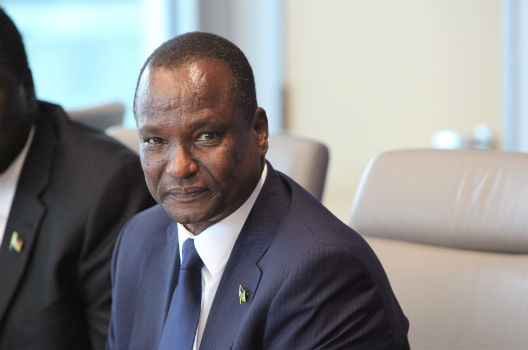 While South Sudan’s First Vice President Taban Deng Gai carries out a public relations offensive in New York and Washington this week, all indications suggest that the country is teetering dangerously close to collapsing back into civil war.
While South Sudan’s First Vice President Taban Deng Gai carries out a public relations offensive in New York and Washington this week, all indications suggest that the country is teetering dangerously close to collapsing back into civil war.
On Friday, Deng addressed the United Nations General Assembly, insisting that South Sudan is “stable, peaceful, and that my government is functioning and life is returning back to normal.” Only a day later, however, the country’s top opposition leader and former vice president, Riek Machar, issued calls for renewed armed resistance against President Salva Kiir’s government.
While the US Department of State “strongly condemned” Machar’s renewed call to arms, veteran South Sudan watchers have called the move anticipated, following Machar’s hasty exit from the capital city of Juba in July after government forces destroyed his house. Machar was subsequently replaced as first vice president by Deng, a controversial move likely in violation of the August 2015 peace agreement. While the peace agreement is still technically in effect, it remains unclear how widely it is being observed.
Since Saturday, the veiled reports trickling out of the country suggest that the political situation is deteriorating. On Tuesday morning, Machar’s forces reported an attack by government troops on their garrison in the northern town of Bentiu, the capital of Unity State. An opposition spokesperson indicated that Machar’s troops were planning action against government forces in Juba and advised UN staff to evacuate the capital to avoid being trapped in the fighting.
Also on Tuesday, top leadership of the Cobra Faction of the South Sudan Democratic Movement/Army (SSDM/A) of the government’s armed forces publically defected from Kiir’s government, indicating that their 16,000 troops would join opposition forces fighting against Juba. The SSDMA/A is composed mostly of ethnic Murle South Sudanese.
Kiir’s military has also been investing in more technically advanced weaponry, recently acquiring two Aero L-29 Albatros fighter jets. While the origin of these jets remains unclear, preliminary reports suggest that they were serviced and painted in Uganda, a country with which South Sudan has a military cooperation accord.
Even in Juba, firmly under the control of Kiir’s forces, stability remains elusive. On Tuesday night, twenty minutes of intense shooting broke out in a suburb of Juba. Police blamed the incident on “criminals” and refused to provide additional details. The crackdown on press freedom also continues. Earlier this week, the body of veteran journalist Isaac Vuni was found in Juba. Vuni, a vocal critic of the Kiir administration, was abducted by unidentified troops in June 2016 (though unofficial reports suggest that his abductors were wearing government-issued military uniforms). Since December 2013, over eight journalists have been killed in South Sudan.
Moreover, the rainy season in South Sudan, which typically makes the roads impassable and fighting difficult, is quickly coming to an end. Average precipitation rates typically drop significantly through October and November. Fighting is more likely in the coming months as commanders are able to more easily move supplies and personnel. South Sudanese refugees continue to flood into neighboring Uganda and the Democratic Republic of Congo, another warning sign that local populations are anticipating an escalation.
Taken together, these indicators suggest that renewed fighting may not be far off for the world’s youngest country.
More troubling still, however, is the rising protection threat facing the 200,000 South Sudanese civilians—mostly women and children—sheltering in UN-administered Protection of Civilians (POC) sites, many of whom belong, like Machar, to the Nuer ethnic group, the second largest in the country. Deng, while also ethnically Nuer, has been denounced both by the ethnicity’s tribal chiefs, as well as Machar’s Sudan People’s Liberation Movement-in-Opposition. In his visit to Washington this week, Deng accused Machar of refusing to allow the civilians to leave the camps, of politically organizing, and recruiting in them. There is little available evidence to support this claim.
Regardless of its validity, this claim should be a red flag for the international community. If the country were to regress into civil war, accusations that POCs are benefiting Machar could be easily used as a justification to attack them. While the United National Mission in South Sudan (UNMISS) is responsible for protecting the camps, the force has failed to stop several massacres in them in the past. UNMISS inaction during the attack of the Terrain Hotel compound in Juba and gang-rape of foreign aid workers by South Sudanese troops, despite being located less than a mile away, was also likely noted by those keen on disbanding the camps. The United Nations Security Council has authorized a more robust protection force for the country, but the Kiir administration has repeatedly stalled its deployment, squabbling over various details.
Ultimately, however, effective protection of South Sudanese will require more than peacekeepers. Decisive international action in South Sudan is urgently needed to prevent a collapse back into civil war.
Julian Wyss is a program assistant in the Atlantic Council’s Africa Center. Follow him at @JulianSWyss
Image: First Vice President of South Sudan Taban Deng Gai speaks at the Atlantic Council on September 28th.
